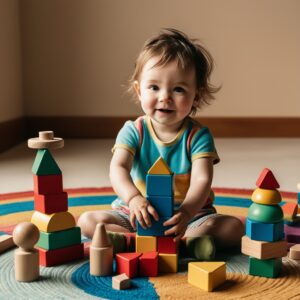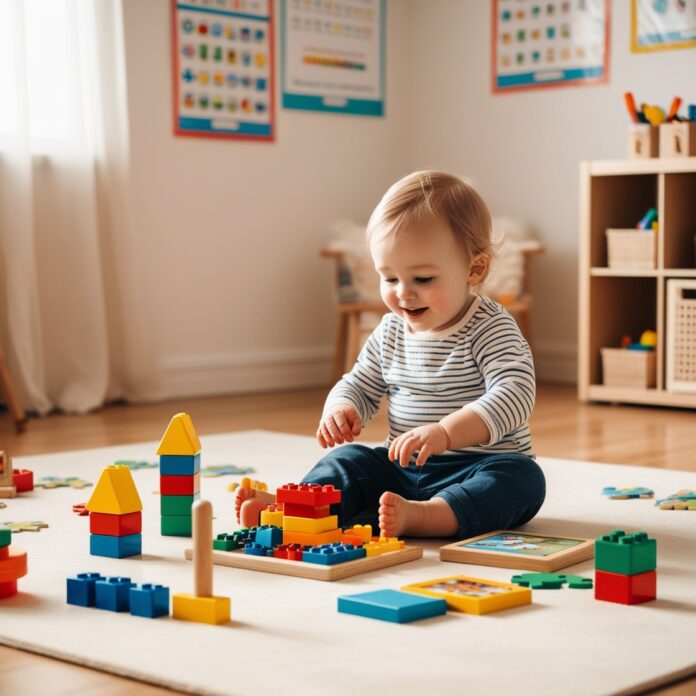There is nothing more wonderful for parents than bringing up a baby and watching them not only grow but also develop new skills and become more independent. Of the various abilities that toddlers cultivate, problem-solving is to be rated the most important. Enabling a child to deal with problems is the main thing which is going to be the basis of his/her working-wisely in the future, organizing his/her emotions and understanding life difficulties. However, what are the ways to aid a toddler in developing such skills very early?
Today we will learn about how we can help kids to improve the problem-solving skill of an early stage and be very effective in solving problems. If it is through playing, communicating or only simple and ordinary everyday activities, you can instil in them the ability to think critically and independently. Let’s dig into how we can nurture these vital skills.
The Significance of Problem-Solving Skills in Toddlers
Firstly, it would be good to estimate why problem-solving skills are so important for toddlers. Exploring the surrounding world becomes more conscious and active at this developmental stage. This way the toddler creates deeper, sharper mind by “learning new things and making mistakes.” Toddler stage is the time when a child is enjoying the most important period of learning in his/her life. Solving problems, therefore, is very important because it is a sign that children can perform such cognitive tasks and a result of creative thinking as well.
If children are able to function in life, i.e., perform daily activities, the executive function is fully developed. Executive functions comprising of planning, decision-making, and adaptability to new situations, which are fundamental for a child’s cognitive growth, by means of the brain being trained towards new challenges.
Practical Tips to Foster Early Problem-Solving Skills
- Give Access to Open-Ended Play Materials
One of the most efficient methods to enhance problem-solving skills among kids is to let the child play with open-ended materials. Open-ended materials are toys that can be used in many ways and the child is open to explore by using his or her creativity to understand the way it operates.
- Building Blocks: Wooden blocks, Lego sets, or stacking toys are the types of materials that toddlers can play with to experiment, problem-solve, and even create.
- Shape Sorters: Firstly, the shape sorters are not less than ideal for toddlers who can tackle and understand shapes, space, and matching the pieces. Secondly, it can be made a bit more challenging to the child.

2. Advocate Choice-Making Opportunities
Toddlers adore sensing the fact that they are the ones holding the reins in their surroundings. Therefore, let them exercise their power of decision within the scope of simple questions. These questions can be of the sort:
- Which shirt is their favorite one to wear today?
- Which snack is their choice to eat?
- Should they choose building blocks over playing outside and taking a walk?
Granting kids the right to choose enables them to perfect the art of decision-making and teaches them how to analyze the options. As time goes by, children will become more self-sufficient in the process of problem-solving.

3. Introduce Problem-Solving Games and Activities
Smart games and activities are the perfect way to boost problem-solving skills while also having fun. These activities can benefit little ones in letting them learn the art of waiting as well as the importance of thinking critically, and also it can show them the right way to solve the tasks step by step.
- Puzzle Games: Toddlers can comprehend cause-and-effect relationships, match shapes, and solve problems with easy puzzles. You can move from bigger parts to smaller ones as they manage to cope with success. Starting with larger pieces, and then slowly increasing the complexity of the puzzles, as the kids could solve them..
- Sorting and Classifying: Children can also develop problem-solving and categorization skills by classifying toys according to their color, size, or shape. It has also been found that children often pay attention to familiar ways of sorting and thus not realize all the toys and different ways they can be arranged.

4. Model Example from Daily Situations That Require Solving a Problem
Little kids pick up a lot of new information while watching their parents. By showing the problem-solving process in your life, you are teaching your kid through modeling. For instance, you can be polishing off a toy that is broken down or finding a misplaced item. You can involve your child in your thinking process by conversely turning the matter over to him/her.
- “Hmm, I wonder where I left my keys. Let’s think. I put them in my purse yesterday, so they might still be there.”
- “The puzzle doesn’t fit quite right. Let me try turning the pieces around.”
Voicing your steps in solving the problem will lay a good foundation for the toddler to manage and tackle the obstacles on his/her own.
5. Provide Them with an Opportunity to Solve Problems Themselves
The most common parental instinct is to aid their young children when they face a difficulty, but that is not all the time the best thing you can do; instead take a step back and allow them to find the solution on their own. If the issue is opening the lid of a box or getting dressed, by letting them try to solve the problem, you are lighting a fire under them to develop perseverance and problem-solving skills.
Of course, if necessary, you can be there to encourage them, but at the same time, please insist on a few more trials until they really need your help. A complimenting and always optimistic outlook on every part of their effort they put into practice — will strengthen your child’s positive mood and, therefore, will reinforce the habit of solving problems.

6. Involve Situations That Happen In Daily Lives as Part of Your Practice in Solving a Problem
Young children do not require guided sessions to learn problem-solving skills. Various daily activities offer a great number of problems that a toddler deals with and solves by himself. For example, a child who is having a hard time zipping up his jacket, you can help him find a solution by saying, “Can you see if the zipper is in the right position before we pull it up?”
You can also make use of cooking, cleaning, or gardening as a medium to enable problem-solving. Some of the questions that can be asked include “What is the next step that we are to do?” and “How do we ensure that the plants receive enough water?”.
The Role of Emotional Support in Problem-Solving
It’s of utmost importance to keep it in your mind that emotional support is that thing that takes part in the development of problem-solving skills. When toddlers are left to face a challenge the wrong way due to their feelings they are still learning about, it’s essential to provide a source of support that will help them to regulate their emotions and cope with their failures like, “It’s okay if it doesn’t work the first time. Let’s try again!”
By being a facilitator that creates an environment of positive reinforcement, you empower your toddler to build perseverance and strength together. This emotional foundation is of great importance just like cognitive skills in solving the issues.
Instilling and nurturing problem-solving skills in your toddler from an early stage is one of the most invaluable presents you can give them as they embark on the path of knowledge and growth. You may use playful activities, decision-makers, or role modeling as some of the many vehicles in nurturing this crucial skill.
It is not mere about the solution but equally about the process, every small step taken towards the solution is counted.
By providing a nurturing environment that encourages kids to make mistakes, be persistent, and refine the process, you are paving the way for toddlerhood characterized by the principles of initiative, creativity, and success. So, what is holding you back? Just take your pick out of these simple to implement yet effective strategies and see magic happen to your child.



